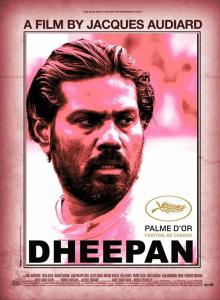 In “Dheepan,” a Sri Lankan Tamil warrior gets smuggled into France as a refugee, but not before being paired with a family who will allow him to escape. A 25-year-old woman searches the Sri Lankan slums and plucks an orphan 9-year-old girl from the crowd to pose as her daughter. In an instant, the three are in this together.
In “Dheepan,” a Sri Lankan Tamil warrior gets smuggled into France as a refugee, but not before being paired with a family who will allow him to escape. A 25-year-old woman searches the Sri Lankan slums and plucks an orphan 9-year-old girl from the crowd to pose as her daughter. In an instant, the three are in this together.
“Dheepan” doesn’t concern itself with politics, but it will change how people look at the refugee crisis around the world because of how the film deals with acclimating to and accepting new conditions.
Jacques Audiard’s (“A Prophet,” “Rust and Bone”) film, the winner of the Palme D’Or at Cannes 2015, isn’t limited to the story of its title character Dheepan (Jesuthasan Antonythasan). His “wife” Yalini (Kalieaswari Srinivasan) and his “daughter” Illayaal (Claudine Vinasithamby) are equally at risk of trying to survive away from home. Dheepan gets a job in France as a caretaker for some low rent apartments, and Yalini takes up housekeeping for an elderly man, all while trying to navigate the gang activity and violence going on around them.
Thankfully for them, life in even this poorer region of France proves to be a major improvement from the war torn Sri Lanka. Illayaal gets her own room and a chance to go to school. Yalini asks their landlord if it’s okay to drink the tap water, and he reacts as though it were a bizarre question. Dheepan quickly earns respect and good money as a capable handyman, a step up from incinerating corpses. And all the people of their community are generally polite.
More troubling is how the three manage to keep up the appearance of a family without any love in their life. Yalini hints that she wants to call her cousin and move to London, even at the expense of leaving Illayaal behind. As for Dheepan, he can’t seem to shake the war he left behind, watching clips of the footage from back home, and the film comes to a sensational end when he manages to recreate those same horrors in France.
Audiard’s strength lies in extracting some tantalizing, surprising imagery from this grim, realistic story. To start the film, Dheepan emerges from a black abyss wearing blinking red and blue mouse ears, a surreal beacon for a man adrift. A few moments linger on an elephant’s face creeping out from within the deep forest, and that sense of lurking danger carries throughout the wide angle crane shots looking over the slums.
But above all, “Dheepan” succeeds because it’s a complex story of how people acclimate to practical surroundings and emotional ones. This family’s grief and culture clash struggles aren’t near as interesting as whether they’ll manage to stick together, and “Dheepan” has drama in both realms in spades.
3 ½ stars